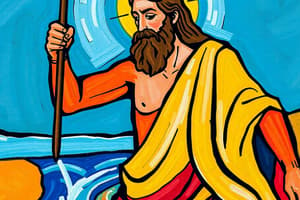Podcast
Questions and Answers
Match the aspects of John's ministry with their descriptions:
Match the aspects of John's ministry with their descriptions:
Baptism = Sign of individual and personal repentance Confession of sins = A prerequisite for baptism Herod Antipas = Challenged by John regarding his marital decisions Social morality = The core of John's appeal for change
Match the key figures with their relevance to John's ministry:
Match the key figures with their relevance to John's ministry:
Jesus = The one whose baptism foreshadows his mission John the Baptist = Prophet calling for personal change Herod Antipas = King who feared John’s influence on the people Tax collectors = Target of John's calls for fair practices
Match the issues addressed by John with their implications:
Match the issues addressed by John with their implications:
Divorce = Criticized by John in relation to Herod Baptism for forgiveness = Represents hope for individual salvation Ritual purity = Not emphasized in John's message Social justice = Highlighted in John's teachings to the people
Match the prophetic tradition with John's approach:
Match the prophetic tradition with John's approach:
Match the outcomes of baptism according to John's teachings:
Match the outcomes of baptism according to John's teachings:
Match the actions encouraged by John with their targets:
Match the actions encouraged by John with their targets:
Match the historical references with their significance:
Match the historical references with their significance:
Match the themes of John's message with their explanations:
Match the themes of John's message with their explanations:
Match the following figures with their relationship to John the Baptist:
Match the following figures with their relationship to John the Baptist:
Match the following events with their descriptions related to John and Jesus:
Match the following events with their descriptions related to John and Jesus:
Match the following groups with their stance on John's message:
Match the following groups with their stance on John's message:
Match the following quotes with their speakers:
Match the following quotes with their speakers:
Match the following statements with their implications regarding John's role:
Match the following statements with their implications regarding John's role:
Match the following actions with their consequences in the context of John and Jesus:
Match the following actions with their consequences in the context of John and Jesus:
Match the following historical figures with their roles in the narrative:
Match the following historical figures with their roles in the narrative:
Match the following prophesies with their context:
Match the following prophesies with their context:
Match the aspects of John's ministry with their corresponding descriptions:
Match the aspects of John's ministry with their corresponding descriptions:
Match the metaphors used by John to their meanings:
Match the metaphors used by John to their meanings:
Match the groups John called to repentance with their significance:
Match the groups John called to repentance with their significance:
Match the consequences of Israel's actions according to John with their outcomes:
Match the consequences of Israel's actions according to John with their outcomes:
Match the references to John's warnings to the respective quotes:
Match the references to John's warnings to the respective quotes:
Match John's activities with their significance:
Match John's activities with their significance:
Match the themes in John's message with their implications:
Match the themes in John's message with their implications:
Match John's identity traits with their characteristics:
Match John's identity traits with their characteristics:
Flashcards are hidden until you start studying
Study Notes
The Role of John the Baptist
- Baptism: John the Baptist's baptism focused on individual repentance. It symbolized a personal change of heart, not just ritual purification.
- Repentance: John preached that all individuals in Israel needed to repent and experience a change of heart, not just the king or leaders.
- Prophecy of Destruction: John prophesied an impending catastrophe for Israel if they did not change their ways.
- Nature of Catastrophe: The type of catastrophe John predicted is not definitively stated, but it may have been a war.
- Social Morality: John emphasized the need for social morality - sharing possessions, honest taxation, and a rejection of violence and extortion.
- Herod Antipas: John criticized Herod for divorcing his wife and marrying Herodias, his half-brother's wife.
- Herod's Arrest: John's criticism of Herod's divorce and re-marriage led to his arrest. Herod feared the potential for political instability.
- John's Influence on Jesus: John the Baptist was the only person in Jesus' society whom he respected. Jesus was baptized by John, signifying his acceptance of John's prophecy of an impending judgment.
- John's Style: John's preaching style was similar to the prophets of old. He utilized vivid imagery, such as a forest fire, and metaphors of Judgment like axes and winnowing fans.
- God Can Create a New People: John asserted that God could create a new people if Israel failed to repent. He emphasized that being a descendant of Abraham was not enough for salvation.
- Jesus' Agreement: Jesus agreed with John's fundamental message about an impending catastrophe for Israel. This puts him in contrast with the Pharisees, Zealots, Essenes, Sadducees, scribes and apocalyptic writers, who did not believe in a judgment against all of Israel.
John's Message and Prophecy
- Prophetic Warning: John's message wasn’t simply a prediction; it was a warning of God's judgment and a promise of salvation, both conditional upon Israel's response.
- Divine Intervention: John preached that God was about to intervene in history and would condemn and destroy Israel.
- Conditional Response: Whether Israel faced judgment or received blessings depended on their free choice to repent or remain unchanged.
- Emphasis on All Individuals: John addressed his message to all individuals in Israel, regardless of their position or background. He called on sinners, prostitutes, tax collectors, soldiers, scribes, and Pharisees to repent.
Studying That Suits You
Use AI to generate personalized quizzes and flashcards to suit your learning preferences.




